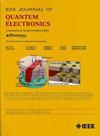Self-Consistent Approach for Calculation of VCSEL Spectra Under Deep Microwave Current Modulation
IF 2.2
3区 工程技术
Q3 ENGINEERING, ELECTRICAL & ELECTRONIC
引用次数: 0
Abstract
We develop a self-consistent approach to calculate the spectra of the vertical-cavity surface-emitting lasers under a deep microwave modulation of the injection current. The treatment consists of solving a coupled system of equations for the concentration of electrons in the active medium and those for the amplitudes of spectral components derived from Maxwell’s equations. Their numerical solution demonstrates the specific asymmetry of experimental laser spectra under microwave modulation of the injection current. The presented method also accounts for the simultaneous modulation at multiple frequencies. We demonstrate that the laser spectrum can be controlled to some extent, namely, its carrier can be suppressed and the ratio of the first sidebands powers can be simultaneously changed by additional modulation of the injection current at doubled frequency. In addition, we show that the phase difference of these components is stable under variations of modulation parameters in a relatively wide range.计算深微波电流调制下 VCSEL 光谱的自洽方法
我们开发了一种自洽方法,用于计算垂直腔面发射激光器在注入电流的深微波调制下的光谱。该方法包括求解有源介质中电子浓度的耦合方程组,以及由麦克斯韦方程组导出的光谱分量振幅的耦合方程组。他们的数值解法证明了在微波调制注入电流的情况下,激光实验光谱的特殊不对称性。所提出的方法还考虑了多频率同时调制的情况。我们证明,激光光谱在一定程度上是可以控制的,即其载流子可以被抑制,第一边带功率的比值可以通过额外的双倍频率注入电流调制同时改变。此外,我们还证明了这些分量的相位差在相对较宽的调制参数变化范围内是稳定的。
本文章由计算机程序翻译,如有差异,请以英文原文为准。
求助全文
约1分钟内获得全文
求助全文
来源期刊

IEEE Journal of Quantum Electronics
工程技术-工程:电子与电气
CiteScore
4.70
自引率
4.00%
发文量
99
审稿时长
3.0 months
期刊介绍:
The IEEE Journal of Quantum Electronics is dedicated to the publication of manuscripts reporting novel experimental or theoretical results in the broad field of the science and technology of quantum electronics. The Journal comprises original contributions, both regular papers and letters, describing significant advances in the understanding of quantum electronics phenomena or the demonstration of new devices, systems, or applications. Manuscripts reporting new developments in systems and applications must emphasize quantum electronics principles or devices. The scope of JQE encompasses the generation, propagation, detection, and application of coherent electromagnetic radiation having wavelengths below one millimeter (i.e., in the submillimeter, infrared, visible, ultraviolet, etc., regions). Whether the focus of a manuscript is a quantum-electronic device or phenomenon, the critical factor in the editorial review of a manuscript is the potential impact of the results presented on continuing research in the field or on advancing the technological base of quantum electronics.
 求助内容:
求助内容: 应助结果提醒方式:
应助结果提醒方式:


